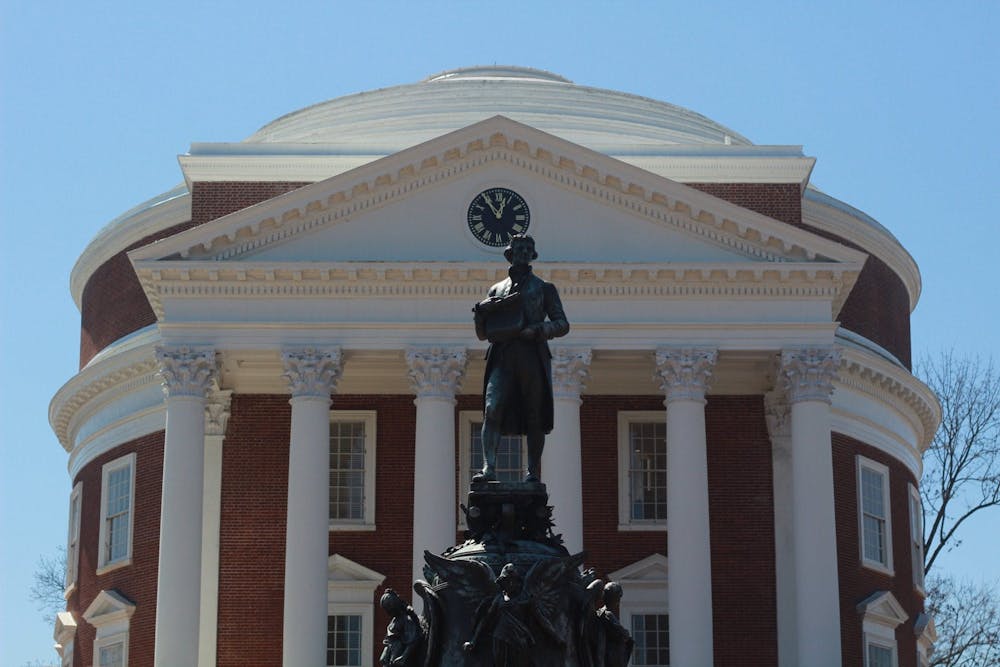Young American for Freedom at U.Va. hosted a panel of speakers Thursday to discuss the legacy of Thomas Jefferson titled “In Defense of Mr. Jefferson.” Rich Lowry, class of 1990 alumnus and editor of the National Review, and Texas Representative Chip Roy, class of 1994 alumnus, served as keynote speakers.
The event took place despite criticism from students about defending the legacy of Jefferson, who owned more than 600 enslaved men, women and children throughout the course of his life and publicized views on Black inferiority. Signs campaigning against the event were placed in various locations around Grounds and a promotion for the event on Beta Bridge was defaced with profanity. The organization’s since-deleted Oct. 3 Instagram post announcing the event drew over 100 comments.
YAF is the student chapter of the national conservative organization Young Americas Foundation, which is dedicated to "ensuring that increasing numbers of young Americans understand and are inspired by the ideas of individual freedom, a strong national defense, free enterprise, and traditional values," according to its website.
YAF has previously drawn attention at the University for posting selectively-edited videos of a Student Council meeting, leading to the subsequent harassment of multiple representatives of color. Members of the organization caused confusion in September after they claimed flags and signs put up as a part of their 9/11 Never Forget Project were vandalized. The University Police Department investigation into the alleged vandalism categorized it as a “false alarm,” and concluded that natural elements took down the property.
At Thursday's event, Lowry spoke first, maintaining Jefferson’s admirability in the face of his legacy receiving a "sustained assault all around the country." Lowry warned of a future in which Jefferson would no longer be recognized for his positive contributions to American political culture and the country’s education system.
"At this rate, the sage of Monticello will see the Jefferson Memorial bulldozed in a few years and see his image defaced from the nickel," Lowry said. "What this represents, in my view, is a campaign of woke philistinism that is historically illiterate, that is heedlessly destructive, and that is profoundly wrongheaded."
Lowry acknowledged that Jefferson’s participation in enslavement was a “hideous injustice,” however.
"Jefferson is on a pedestal for his achievements that still define this country today — and for the better," Lowry said.
Roy spoke next, defending Jefferson as a man who was not infallible.
“None of us are perfect," Roy said.
He then compared Jefferson's moral failings with those of other towering figures in U.S. history, from Abraham Lincoln suspending habeas corpus during the Civil War to Franklin D. Roosevelt's use of internment camps, Lyndon B. Johnson's alleged affairs and Martin Luther King, Jr's accusations of plagiarism.
"The simple truth is in this country — in significant part due to Mr. Jefferson's words, his work and his many deeds — we put our faith in the people and principles, not in princes," said Roy. "That is the fundamental Jeffersonian legacy, is the fundamental truth about our country that emanates from our founding. That is why we venerate him."
The rest of Roy’s speech moved away from Jefferson's historical biography to how Jefferson's values relate to contemporary political issues. Roy called resistance to vaccine mandates and securing the Southern border "Jeffersonian," and spoke on the need for parents to have control over what is taught in their children's school, a reference to recent Republican anxiety over critical race theory and school mask mandates.
Despite DNA evidence confirming that Jefferson fathered at least six children with Sally Hemings, an enslaved woman who lived and worked at Monticello, Lowry cast aspersions on the reliability of the evidence, referring to a "possible relationship" with Hemings.
Nickolaus Cabrera, chairman of YAF at U.Va. and second-year College student, said he was pleased with the civility of the event given that he was expecting a more antagonistic crowd after student pushback.
"I'm definitely glad that people came who disagreed with the event," Cabrera said. "The questions were amazing. [It] definitely fostered some well needed discussion, and I hope that we see more of this at the University for years to come."
Fourth-year College student Tristan Williams attended the event and said he hopes to see more discussion of what he sees as the positive aspects of the Jeffersonian legacy.
"I'm really compelled by a lot of the things he did," Williams said. "I'm really compelled to think that he was sort of a great guy who's legacy I personally want to uphold at this university. I think there's room for more people thinking about it, at the very least."







